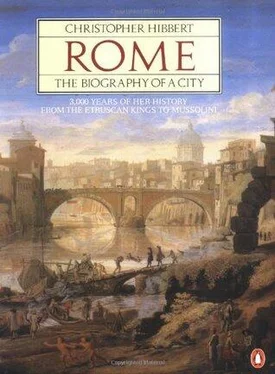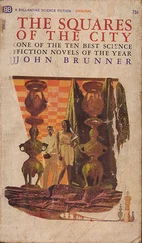Christopher Hibbert - Rome. The Biography of the City
Здесь есть возможность читать онлайн «Christopher Hibbert - Rome. The Biography of the City» весь текст электронной книги совершенно бесплатно (целиком полную версию без сокращений). В некоторых случаях можно слушать аудио, скачать через торрент в формате fb2 и присутствует краткое содержание. Жанр: Культурология, Искусство и Дизайн, на английском языке. Описание произведения, (предисловие) а так же отзывы посетителей доступны на портале библиотеки ЛибКат.
- Название:Rome. The Biography of the City
- Автор:
- Жанр:
- Год:неизвестен
- ISBN:нет данных
- Рейтинг книги:3 / 5. Голосов: 1
-
Избранное:Добавить в избранное
- Отзывы:
-
Ваша оценка:
- 60
- 1
- 2
- 3
- 4
- 5
Rome. The Biography of the City: краткое содержание, описание и аннотация
Предлагаем к чтению аннотацию, описание, краткое содержание или предисловие (зависит от того, что написал сам автор книги «Rome. The Biography of the City»). Если вы не нашли необходимую информацию о книге — напишите в комментариях, мы постараемся отыскать её.
Rome. The Biography of the City — читать онлайн бесплатно полную книгу (весь текст) целиком
Ниже представлен текст книги, разбитый по страницам. Система сохранения места последней прочитанной страницы, позволяет с удобством читать онлайн бесплатно книгу «Rome. The Biography of the City», без необходимости каждый раз заново искать на чём Вы остановились. Поставьте закладку, и сможете в любой момент перейти на страницу, на которой закончили чтение.
Интервал:
Закладка:
For all their vaunted merits, however, the Twelve Tables did not bring the plebeians any closer to sharing authority with the Senate; nor did those theoretical powers they possessed, such as the sole right to declare war in their public Assembly, ever count for much. The Senate remained the effective government of Rome, and the men from those almost invariably rich families who constituted its membership also filled, as though by right, the principal offices of the Republic. The most venerable of these offices was that of the Consuls who wore red sandals with crescent-shaped buckles and leather thongs and a special toga with a wide purple band, and who, like the kings before them, were escorted by twelve lictors carrying the fasces , the rods and axe, as an emblem of state. Other, lesser offices, also occupied by patrician families, were the Quaestors, who, after 421 B.C., were responsible for financial administration; the Censors, who were established in 440 B.C. to supervise the returns which determined the responsibility of citizens for taxes and military service; the Praetors, who presided in the courts of law; and the Aediles, who were responsible for the streets, temples, sewers and market-places of the city and who organized public displays, games and festivals. In times of crisis a Dictator could be appointed with supreme power and with the right to an escort of twenty-four lictors, though not with the right to ride a horse in Rome, a privilege that might have given him pretensions to regality.
As well as the political offices, there were the religious ones, and these, too, the patricians fought hard to keep out of the hands of the plebeians. They were all of great influence and none more so than the High Priest, the Pontifex Maximus, who, as master of the ‘sacred law’, presided over the College of Pontiffs. Responsible not only for adjustments in the calendar made necessary by a Roman year of 355 days and for all occasions in life or death, such as marriages, adoptions and burials, in which ritual was involved, the Pontifex Maximus also had charge of the virgins who served Vesta, the goddess of the hearth, whose circular temple, one of the earliest in Rome, was built in the centre of the Forum. 9These priestesses, free of all bodily defects and chosen between the ages of six and ten, were handed over in the House of the Vestal Virgins 10in the Forum by their fathers to the Pontifex Maximus who thereafter had full control over them. They were required to remain unmarried for thirty years and to devote that time to offering sacrifices, to performing the ordained rites, and to tending the sacred fire which symbolized the survival of the state. ‘And severe penalties have been established for their misdeeds,’ in the words of the Greek historian, Dionysius of Halicarnassus. ‘Vestals who are guilty of lesser misdemeanours are scourged with rods, but those who have suffered defilement by unchastity are delivered up to the most shameful and the most miserable death [by being buried alive]… There are many indications, it appears, when a priestess is not performing her holy functions with purity, but the principal one is the extinction of the fire which the Romans dread above all misfortunes, looking upon it, from whatever cause it proceeds, as an omen which portends the destruction of the city.’
In addition to his other duties, the Pontifex Maximus was responsible for ensuring that the gods were not mocked or displeased and that their wishes were made known. In divining these desires or commands he had the assistance of Augurs who were expert in interpreting the signs by which deities communicated their will to the earthly world in the voice of thunder or by flashes of lightning, by movements in the entrails of sacrificed animals, or by the flight of birds.
Ever since Romulus had seen in the flapping of vultures' wings a favourable omen for his foundation and governorship of the city, the Roman people had set great store by portents and their proper interpretation; and in times of danger, when unnatural events were often witnessed, they heard with alarm the spreading reports of monstrous births, of strange objects in the heavens, of statues pouring blood, of talking animals, of weeping corn, of stones and flesh falling from the heavens. Since the rules of divination were guarded by the Augurs in the strictest secrecy, and since portents could be interpreted in all manner of ways and, of course, invented, the powers of the priestly order of Augurs were immense. To prevent an election they had merely to declare that the time was not propitious to hold it; to block a law they had only to pronounce the omens had signified the gods' opposition to it. Cicero, who was later to confess that the office of Augur was the ‘one bait’ which could tempt him back into politics, went so far as to say that the highest and most important authority in the state is that of the Augurs. For what power is greater than that of adjourning assemblies and meetings… or that of declaring null and void the acts of these assemblies?… What is of greater import than the abandonment of any business already begun after a single Augur has announced, ‘On another day’? What power is more impressive than that of forcing the Consuls to resign their offices? What right is more sacred than that of giving or refusing permission to hold an assembly of the people?
The Roman people's readiness to accept the verdict of the Augurs was rarely in doubt; their reverence for the gods was deep and unequivocal, and their offerings to them punctiliously observed, the scrupulous regard for the forms of the rite in Roman religion being held quite as important as the rite itself. The conservative statesman, Marcus Porcius Cato, a rigid upholder of ancestral customs and a large-scale farmer whose treatise on agriculture written in about 160 B.C. is the oldest extant complete prose work in Latin, advised his fellow-farmers:
Before you gather in the harvest you should offer a preliminary sacrifice of a sow pig in the following way. Offer the pig to Ceres before you store away these crops: spelt, wheat, barley, beans, rape seed. First address Janus, Jupiter and Juno with incense and wine before you sacrifice the pig. Offer a sacrificial cake to Janus with these words, ‘Father Janus, in offering to thee this sacrificial cake I make good prayers that thou be kind and favourable to me, my children and my house and household.’… [Also] make an offering to Mars Silvanus in the wood in the daytime for each head of work oxen. Three pounds of spelt grits, four and one half of lard, four and one half of meat, three sextarii of wine… No woman to be present at this sacrifice or to see how it is offered.
Precise instructions are then given of the words to be employed, of the other gods to be honoured with their due sacrifices, and of how they, too, should be addressed.
The Roman gods, indeed, were numerous and to each a proper and precise respect was due in accordance with their known powers. One god looked after the seed when it was underground, others when the grain was growing, yet others when it was stored. The god Nodutus cared for the stem, Volutina for the sheaths, Flora for the crop in flower, Matuta for it in its maturity, Runcina when it was gathered in.
Individual gods had their own specialist priests known as Flamens, but these were offices not so widely sought as those of the Augurs, for the Flamens were subject to numerous taboos. The Flamen of Jupiter, for example, was not permitted to ride a horse or see the army in battle array, to eat or even name certain foods, to pass under an arbour of vines or to go out into the open air without his cap. Additionally, according to the lawyer, Aulus Gellius, ‘the feet of the couch on which he sleeps must be smeared with a thin coating of clay, and he must not sleep away from his bed for three nights in succession, and no other person must sleep in that bed… If he has lost his wife he must abdicate his office. His marriage cannot be dissolved except by death.’
Читать дальшеИнтервал:
Закладка:
Похожие книги на «Rome. The Biography of the City»
Представляем Вашему вниманию похожие книги на «Rome. The Biography of the City» списком для выбора. Мы отобрали схожую по названию и смыслу литературу в надежде предоставить читателям больше вариантов отыскать новые, интересные, ещё непрочитанные произведения.
Обсуждение, отзывы о книге «Rome. The Biography of the City» и просто собственные мнения читателей. Оставьте ваши комментарии, напишите, что Вы думаете о произведении, его смысле или главных героях. Укажите что конкретно понравилось, а что нет, и почему Вы так считаете.












